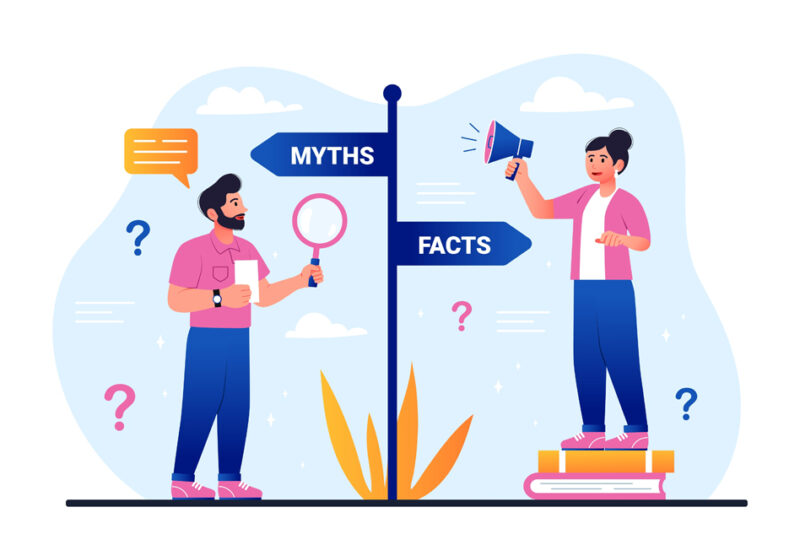Debunking 6 Common Non-Profit Cloud CRM Myths
Moving to “the cloud” has become a popular trend in the charity sector, and with good reason – cloud technologies help organisations overcome their biggest challenge – doing more with less.
As their staff, donations, and volunteers lose ground against increasing demands for resources and benefits, charities are stretched thin and looking for new ways to close that gap.
Cloud technologies provide a flexible, more affordable, and secure solution to achieve that.
But with so much information (and misinformation) out there, it can be challenging to separate fact from fiction. These conflicting views make it easy for misconceptions to hold your organisation back and prevent it from gaining the advantages of the cloud.
This blog post tackles 6 common myths about cloud CRM for charities.
Myth 1: CRM technology is an IT project.
It is a common misconception that charity CRM technology is solely a problem for IT teams. Cloud technology is integral to improving every aspect of your organisation.
That’s because cloud-based CRM solutions offer several benefits that can be harnessed by all parts of your organisation – from fundraising and supporter engagement to finance.
Cloud CRM solutions make it easier and more affordable for everyone to access these benefits without requiring a large, dedicated IT department.
For example, with our Dynamics 365 for Charities, built atop the Microsoft cloud platform, your team can do its best work with:
- More flexibility: Cloud technology allows greater flexibility in work arrangements and locations. Whether managing donations, nurturing supporter relationships, analysing data, or completing other tasks, you can do them from anywhere with an internet connection. This flexibility boosts employee satisfaction and productivity.
- Enhanced collaboration: Cloud technology enables improved cooperation between different departments and individuals within your organisation. Using cloud-based solutions, multiple users can instantly access, update, and share information, eliminating delays and redundant work.
- Real-time data access: Another significant advantage of cloud-based CRM is the ability to access real-time centralised data across your organisation. Instead of dealing with spreadsheets and separate data sources, everyone can instantly view complete and up-to-date information about activities, interactions, and other relevant data in one place. Access to real-time insights leads to informed decision-making, increased productivity, and better service delivery.
Myth 2: Moving to the cloud is too expensive.
Cloud technology can also lead to cost savings because you will no longer need to invest in on-premises hardware or software.
In addition, cloud providers often offer promotions and features which can further reduce costs for non-profit organisations.
Microsoft, for example, offers grants and discounts across its cloud products and services, enabling eligible charities to significantly reduce the costs of running workloads in the cloud.
These include:
- Free Power Apps licensing for up to 10 users and discounted pricing for additional users. These offers are reflected in the pricing for our Charity Hub CRM application that runs on Power Apps and works with Dynamics 365.
- Dynamics 365 Sales Enterprise is free for up to 5 users, with discounted pricing available for additional users.
- Microsoft 365 Business Premium is available at no cost to eligible non-profit organisations for the first ten users and a 75% discount for each additional user.
- Access $3,500 (USD) Azure services credits per year across the complete portfolio of Azure products and cloud services for eligible non-profits.
Myth 3: Moving to the cloud is too complicated.
The cloud has been hailed as a transformative tool for businesses of all sizes. But for smaller organisations, the move to the cloud can seem like a daunting and complicated task.
However, it doesn’t have to be. With careful planning and execution, the transition to the cloud can be a smooth and seamless process.
Rather than transitioning to the cloud as a ‘big bang’ project, charities can move in manageable project phases, minimising costs and interrupting day-to-day operations.
This also allows for early improvements to be made. Because the cloud is a mature technology, many providers have experience assisting non-profits with various migration and deployment paths available.
Myth 4: Continuous updates will break our business apps and add to the IT burden.
It’s important your CRM software stays up to date; that’s why continuous updates are critical.
With frequent weekly CRM updates, you’ll never be behind the times— but what about the impact on your applications?
Here’s the thing: continuous updates won’t negatively impact your applications. In fact, they’ll do just the opposite. Regular updates give you total control over your technology while relieving your IT people of the burden of constant updates.
That’s because, in the cloud, all users have the latest CRM software version. Everyone will be on the same page, and you will save time and money in the long run.
Moving to the cloud also offers IT leaders greater comfort, knowing they don’t have to worry about server-related issues preventing users from accessing the system.
Myth 5: Storing data on-premises is safer.
With high-profile data breaches making headlines in recent years, it’s no wonder that every organisation is concerned about cybersecurity.
However, some charities remain hesitant to move their data to the cloud due to misconceptions about cloud security, preventing them from reaping the benefits of the cloud.
For instance, Microsoft Cloud solutions provide comprehensive security technologies to protect non-profit data. This includes Microsoft Azure Security Centre, a unified infrastructure security management system that strengthens cloud security and lets administrators visualise their security status.
Greater visibility into cloud apps and services allows organisations to control how data travels and combat cyber threats effectively. Cloud providers invest heavily in data encryption, employing many encryption capabilities to protect data at rest and in transit.
Their encryption protocols erect barriers against unauthorised data access, including two or more independent encryption layers to protect against compromises. These protocols are far more rigorous and sophisticated than most non-profits could achieve with an on-premise CRM server deployed system.
Myth 6: New CRM technology and automation will eliminate jobs.
A frequent concern is whether or not cloud CRM technology and automation will eliminate jobs. We want to put your minds at ease by assuring you this is not the case.
In fact, charity CRM process automation aims to allow people to focus more on tasks that only people can do.
Embracing cloud technology and automating tasks reduces the amount of manual work burdening staff, freeing them up to be more productive and spend more time helping your constituents.
Charity CRM and connected cloud products eliminate significant manual work, enabling charities to extend their outreach with the same amount of staff.
Final thoughts.
By doing your research and working with a trusted partner, you can ensure that your charity reaps all the advantages of the cloud without giving anything up.
If you are starting on your cloud journey, we can help you evaluate options and choose the right solution for your charity. Please get in touch with your requirements, and we’ll be happy to help.
Discover our tailor-made CRM Dynamics 365 for charities, including pre-configured donation, membership and Gift-Aid management capabilities.





